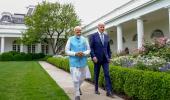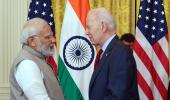'The United States should not, by this logic, expect India to create military distractions along the Line of Actual Control, hold up Chinese shipping in the Indian Ocean, or even openly provide intelligence or basing for US forces transiting the region.'

"The PM's US visit was surely tracked, dissected by Beijing," Ambassador Gautam Bambawale, India's former envoy to China, observed in an eloquent interview posted on Rediff.com last week.
"How would America respond if China invades India?" India watcher Marshal M Bouton asked in another interview posted on these pages last week, adding in a subsequent segment of the interview, "If the US has a conflict with China, where's India going to be?"
If you missed Ambassador Bambawale and Dr Bouton's interviews, you can discover them in the related links posted alongside this interview.
So how does Daniel S Markey, author of the provocative assessment in the July/August issue of the well respected journal Foreign Affairs ('India as It Is: Washington and New Delhi Share Interests, Not Values') view Prime Minister Narendra D Modi's State visit to the US and its impact on the dragon in the room.
Dr Markey -- currently, a Senior Advisor, South Asia at the Washington, DC think-tank, the United States Institute of Peace -- answers Nikhil Lakshman's questions.
The concluding segment of a two-part e-mail interview:
- Part 1 of the Interview: 'China's aggression, Russian's unreliability, convinced India to value US'
Do you believe that of all governments that have ruled India since 1991, the Modi government has been the most America friendly despite its position on the war in the Ukraine?
No. All of India's recent governments have been open to improved ties with the United States, but also somewhat wary of what partnership might entail.
The Modi government includes some Cabinet officials that remain deeply sceptical of the United States, just as was the case in prior governments.
The Vajpayee government was remarkable for jumpstarting closer ties with Washington, and the Manmohan Singh government saw the civilian nuclear agreement through to fruition.
I do think that a combination of political and geopolitical realities has created incentives for the Modi government to pursue closer ties with the United States, but I don't think this is best explained by its being more "America friendly" than its predecessors.
Do you think Prime Minister Modi would like a solid relationship with America to be one of his foreign policy legacies?
Has he been remarkably skilful in dealing with three different Administrations to secure what India wants?
Or has he just been fortunate that the constellation of strategic interests has favoured his government?
Prime Minister Modi seeks to leave a legacy of global statesmanship, a part of which would include solid ties with the United States as well as with other major world powers.
He is a skilled politician and diplomat, and he has invested a tremendous amount of time and energy in enhancing his stature on the world stage.
He has indeed found ways to work with Presidents Obama, Trump, and Biden alike.
However, while the current world order has favoured Modi's efforts to build closer ties with the United States, it has simultaneously undermined India's position in other crucial ways.
A decade ago, India enjoyed far better ties with China, and Russia was a more capable and independent partner for India.
India then had the luxury of working well with every great and medium-sized international power.
Today India is forced to navigate a more challenging international order, one more riven by US-China competition and outright hostility between Russia and the West.
On balance, Modi looks to be as much a victim or "taker" of international geopolitical developments as a skillful maker or shaper of them.

Finally, where do you see the India-US relationship in 2027 when it is said China will undertake its military mission to reunite Taiwan with the mainland, likely dragging Washington into an armed confrontation with Beijing?
Will India-US relations be so transformed by then that India, instead of neutrality, will be assertively supporting the United States, diplomatically and otherwise?
I anticipate that India would be cautious and risk-averse in the event of a war over Taiwan.
Although Indian leaders would be more diplomatically aligned with Washington than they have been during Russia's war with Ukraine (for instance, they would probably vote to condemn China's aggression in the United Nations), they would avoid actions that expose India to direct retaliation by Chinese forces.
The United States should not, by this logic, expect India to create military distractions along the Line of Actual Control, hold up Chinese shipping in the Indian Ocean, or even openly provide intelligence or basing for US forces transiting the region.
That said, there is a greater chance that India would undertake the latter actions quietly, under the assumption that China would be too preoccupied to notice or respond.
In short, India's role would be marginal with respect to core US (or Chinese) military and political war aims.










